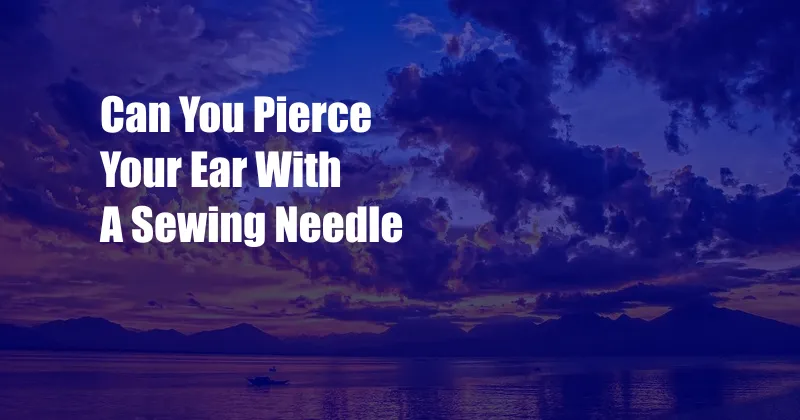
Can You Pierce Your Ear with a Sewing Needle?
As a curious teenager, I longed for pierced ears but lacked the courage to visit a professional. Inspired by a friend’s tale of self-ear piercing with a sewing needle, I embarked on a reckless mission. Armed with a needle, cotton thread, an ice cube, and a dash of youthful audacity, I attempted my own ear piercing. However, as the needle met my earlobe, I recoiled in agony and realized the folly of my endeavor. The resulting infection and scarring served as a painful lesson about the importance of seeking professional ear piercing.
Self-ear piercing carries significant risks, including infection, pain, and permanent scarring. Therefore, it’s crucial to prioritize safety and seek piercing services from a qualified professional. They have the necessary skills, sterile equipment, and knowledge to ensure a safe and hygienic procedure.
Risks of Self-Ear Piercing
Infection: Unsterile needles and improper piercing techniques can introduce bacteria into the piercing site, leading to infections. Symptoms may include redness, swelling, pain, and pus discharge.
Pain: Piercing without proper anesthesia can cause significant pain. Inexperienced individuals may struggle to align the needle correctly, resulting in uneven or incorrectly placed piercings.
Scarring: Improper piercing techniques or excessive force can damage the surrounding tissue, leading to keloids or hypertrophic scars that may be permanent.
Professional Ear Piercing
Professional piercers undergo rigorous training and adhere to strict hygiene protocols. They utilize sterile needles, gloves, and equipment to minimize the risk of infection. Additionally, they employ topical anesthetics to numb the piercing area, ensuring a relatively painless experience.
Professional piercers also assess the individual’s anatomy to determine the optimal piercing location and angle. They provide detailed aftercare instructions to promote healing and minimize complications.
Expert Tips for Safe Ear Piercing
Consult a professional: Seek the services of a qualified and experienced piercer to ensure a safe and satisfactory piercing experience.
Follow aftercare instructions: Adhere strictly to the piercer’s aftercare instructions, including regular cleaning and avoiding touching or removing the piercing jewelry during the healing process.
Avoid self-piercing: Resist the urge to pierce your ears yourself. Self-piercing is risky and can lead to complications.
Consider the risks: Weigh the potential risks and benefits of ear piercing before making a decision. Ensure that you are prepared for the healing process and any complications that may arise.
Be patient: Earlobe piercings typically take 6-8 weeks to heal. Be patient and follow the aftercare instructions diligently to promote optimal healing.
FAQs About Ear Piercing
Q: What is the best way to clean a new ear piercing?
A: Gently clean the piercing twice daily with a sterile saline solution using a cotton ball or gauze pad. Avoid using harsh soaps or rubbing alcohol.
Q: Can I remove the piercing jewelry during the healing process?
A: No, it is crucial to keep the piercing jewelry in place throughout the healing process. Removing it prematurely can lead to scarring or closure of the piercing.
Q: What should I do if my ear piercing becomes infected?
A: Consult a healthcare professional immediately. Signs of infection include redness, swelling, pain, and pus discharge. Prompt treatment is essential to prevent serious complications.
Q: Can ear piercing cause allergies?
A: Yes, some individuals may develop an allergic reaction to certain metals used in piercing jewelry, such as nickel. Choose hypoallergenic jewelry made of materials like titanium or surgical steel.
Conclusion
While the allure of self-ear piercing may be tempting, it is a risky practice that can lead to complications. Prioritize safety and entrust your ear piercing needs to a qualified professional. By following proper aftercare instructions and seeking professional advice when necessary, you can enjoy beautiful and healthy ear piercings for years to come.
Are you considering ear piercing? Share your thoughts and questions in the comments below.